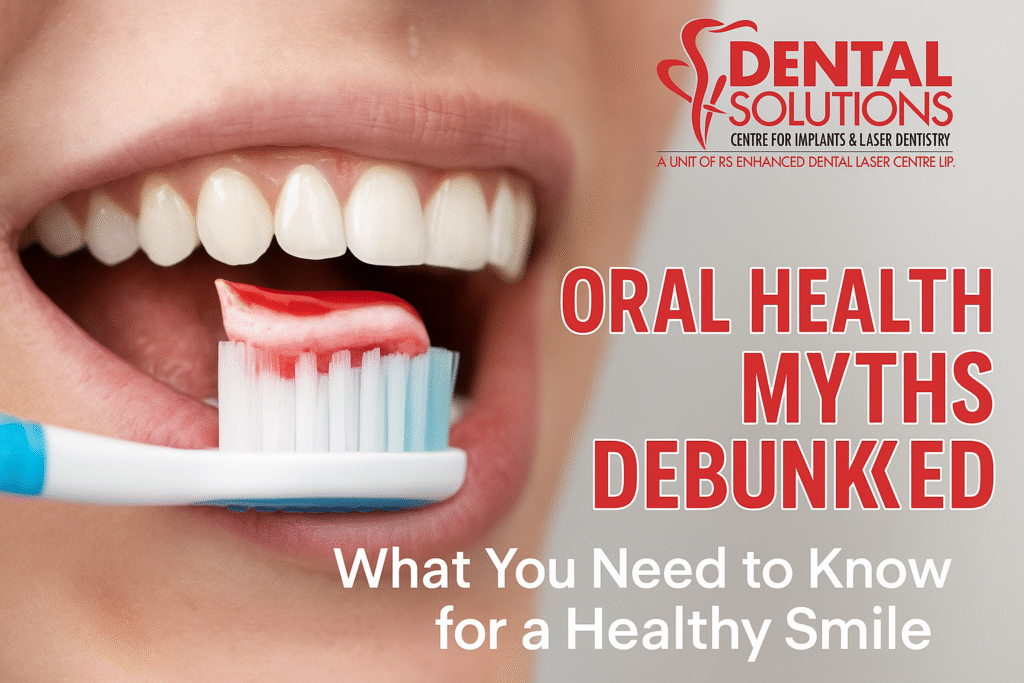Best Dental Clinic In Bangalore Indiranagar | Best Dentist in Bangalore Indiranagar
Home » Blog » General dentistry » Oral Health Myths Debunked: What You Need to Know for a Healthy Smile
Oral Health Myths Debunked: What You Need to Know for a Healthy Smile

When it comes to oral health, there are countless tips and tricks passed down from generations, friends, and even social media. However, not all of these “dental tips” are true. Believing in Oral Health Myths can lead to poor dental hygiene practices and, ultimately, damage your teeth and gums. Let’s separate fact from fiction and debunk some of the most common oral health myths.
Myth 1: Brushing Harder Cleans Your Teeth Better
Fact: Brushing harder doesn’t mean cleaner teeth; in fact, it can damage your tooth enamel and gums. Gentle, circular motions with a soft-bristled toothbrush are most effective. Brushing too hard can cause gum recession and sensitivity.
Myth 2: Sugar Is the Only Cause of Cavities
Fact: While sugar contributes to cavities, it’s not the only culprit. Any carbohydrate-rich food (like bread, chips, or fruit) can produce acids that erode enamel. Poor oral hygiene and skipping flossing also increase cavity risk.
Myth 3: You Don’t Need to See a Dentist if Your Teeth Don’t Hurt
Fact: Many dental problems, such as cavities or gum disease, don’t cause pain until they are severe. Regular dental check-ups (every 6 months) can detect issues early and save you from costly treatments later.
Myth 4: Chewing Gum Can Replace Brushing
Fact: Sugar-free gum may help freshen breath and reduce bacteria slightly, but it’s no substitute for proper brushing and flossing. Gum can never remove plaque like a toothbrush can.
Myth 5: Whitening Damages Your Teeth
Fact: Professional whitening treatments are safe when done correctly. Overusing store-bought whitening products, however, can cause sensitivity. Always consult your dentist before any whitening treatment.
Myth 6: If You Have Bleeding Gums, You Should Avoid Brushing
Fact: Bleeding gums are often a sign of gingivitis caused by plaque buildup. Avoiding brushing worsens the condition. Instead, gently brush and floss, and visit your dentist to treat gum inflammation.
Myth 7: Baby Teeth Don’t Need Much Care Because They Fall Out Anyway
Fact: Healthy baby teeth are essential for speech development, chewing, and guiding permanent teeth. Neglecting baby teeth can cause pain, infection, and misaligned permanent teeth.
Good Oral Health starts with the right information. By avoiding these myths and practicing proper dental care—brushing twice daily, flossing, limiting sugary snacks, and visiting your dentist—you can keep your smile healthy and bright.
Frequently Asked Questions (FAQs)
1. How many times should I brush my teeth?
Dentists recommend brushing your teeth at least twice a day—once in the morning and once before bedtime—with a soft-bristled toothbrush and fluoride toothpaste.
2. Is flossing really necessary if I brush well?
Yes. Flossing removes food particles and plaque between teeth where a toothbrush can’t reach, reducing the risk of cavities and gum disease.
3. Are electric toothbrushes better than manual ones?
Both can clean effectively when used properly. Electric toothbrushes may be easier for people with limited dexterity or for those who want consistent brushing pressure.
4. How often should I visit the dentist?
A dental visit every six months is recommended for routine check-ups and professional cleaning. However, people with dental issues may need more frequent visits.
5. Can mouthwash replace brushing and flossing?
No. Mouthwash is a helpful addition but should not replace brushing and flossing. It helps freshen breath and reduce bacteria but does not remove plaque completely.
